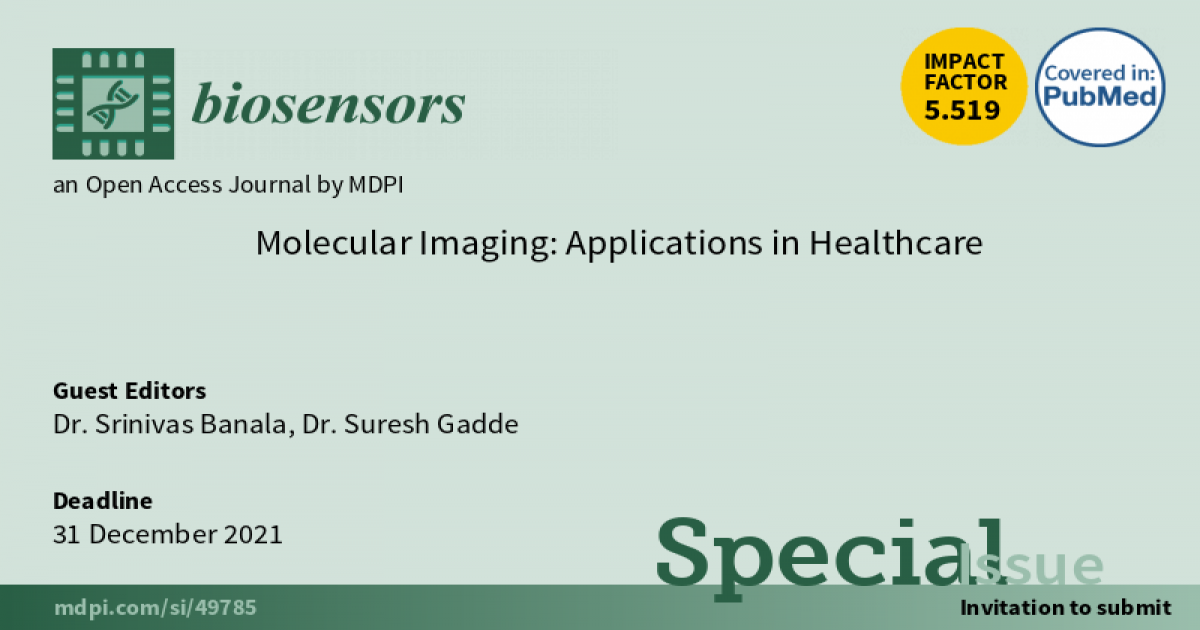Molecular Imaging: Applications in Healthcare
A special issue of Biosensors (ISSN 2079-6374). This special issue belongs to the section "Biosensors and Healthcare".
Deadline for manuscript submissions: closed (30 September 2022) | Viewed by 658

Special Issue Editors
Interests: organic synthesis; imaging probes
Interests: nanomedicine; drug delivery; nano-biointeractions; biomaterials; targeted drug delivery
Special Issues, Collections and Topics in MDPI journals
Special Issue Information
Dear Colleagues,
Molecular imaging (MI) imaging uses different physical properties to produce detectable signals, such as radioactivity, light, magnetic field interactions, and sound (ultrasound), in combination with a respective tracer or contrast agent. Over the last 25 years, MI modalities have been evolved and enabled us to non-invasively study variety of biological processes related to different diseases progression at the tissue, cellular and molecular levels. The information gained via molecular imaging led to advancing diagnosis, as well as early detection of variety of life-threatening diseases such as cancer, atherosclerosis etc. The goal of this Special Issue is to highlight the state of the imaging modalities, the tracer developmental strategies and applications in pre-clinical as well as clinical research. The issue will highlight contrast agents for stand-alone single modality, multi-modality suited and those changing signal properties in response to short-lived species. The ultimate goal is to show a tracers’ performance by in vivo detection. Therefore, probes suitable for or studied in vivo will be favored for the issue.
The journal Biosensors has played a major role in highlighting and recognizing the technologies needed for medical imaging diagnostics. This Special Issue on ‘Molecular Imaging’ will complement and expand on the scope of the journal by showcasing novel advances in multimodal imaging.
Both research papers and review articles will be considered. If you are interested in contributing to this Special Issue, I would very much appreciate receiving the tentative title of your contribution.
Dr. Srinivas Banala
Dr. Suresh Gadde
Guest Editors
If you want to learn more information or need any advice, you can contact the Special Issue Editor Jessica Zhou via <jessica.zhou@mdpi.com> directly.
Manuscript Submission Information
Manuscripts should be submitted online at www.mdpi.com by registering and logging in to this website. Once you are registered, click here to go to the submission form. Manuscripts can be submitted until the deadline. All submissions that pass pre-check are peer-reviewed. Accepted papers will be published continuously in the journal (as soon as accepted) and will be listed together on the special issue website. Research articles, review articles as well as short communications are invited. For planned papers, a title and short abstract (about 100 words) can be sent to the Editorial Office for announcement on this website.
Submitted manuscripts should not have been published previously, nor be under consideration for publication elsewhere (except conference proceedings papers). All manuscripts are thoroughly refereed through a single-blind peer-review process. A guide for authors and other relevant information for submission of manuscripts is available on the Instructions for Authors page. Biosensors is an international peer-reviewed open access monthly journal published by MDPI.
Please visit the Instructions for Authors page before submitting a manuscript. The Article Processing Charge (APC) for publication in this open access journal is 2200 CHF (Swiss Francs). Submitted papers should be well formatted and use good English. Authors may use MDPI's English editing service prior to publication or during author revisions.
Keywords
- optical imaging
- photo-/opto-acoustic imaging
- positron/single-photon emission imaging
- magnetic resonance imaging
- invivo imaging modalities
- intravital imaging
- detection of short-lived species
- detection of biomarkers
Benefits of Publishing in a Special Issue
- Ease of navigation: Grouping papers by topic helps scholars navigate broad scope journals more efficiently.
- Greater discoverability: Special Issues support the reach and impact of scientific research. Articles in Special Issues are more discoverable and cited more frequently.
- Expansion of research network: Special Issues facilitate connections among authors, fostering scientific collaborations.
- External promotion: Articles in Special Issues are often promoted through the journal's social media, increasing their visibility.
- e-Book format: Special Issues with more than 10 articles can be published as dedicated e-books, ensuring wide and rapid dissemination.
Further information on MDPI's Special Issue policies can be found here.






